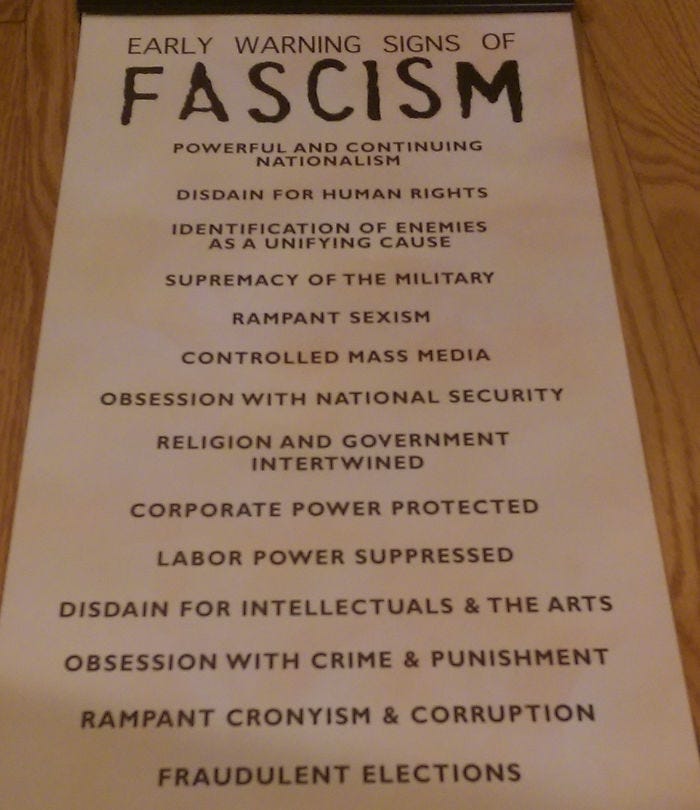The 14 Early Warning Signs of Fascism
The US economic system is deeply fascistic. The antidote is obvious: capitalism.
It has been nearly 20 years since I’ve stepped foot inside the Holocaust Museum, and because of a scheduling conflict I wasn’t able to stay very long.
If you go there today, you’ll find no shortage of warnings on the depths humanity can sink to when it embraces statism, racism, collectivism, and aggression.
For many years, I wondered why Germans, the most educated people in the world, couldn’t see what was happening in their country in the 1930s. Only later did I realize many did see; they were just unable to stop what was happening. Many Germans fled the country during the rise of the Nazis, while others—men like Dietrich Bonhoeffer—died trying to save their country from the fascists.
What few Americans seem to realize is that their country’s economic system has long been closer to fascism than they’d like to believe. More frightening is that other elements of fascism, cultural and political, are creeping into American society.
How do I know this? I could go on at lengthy on Stasi-like federal agencies monitoring innocent Americans and meddling in presidential elections, but I don’t need to.
As it happens, the Holocaust Museum for years sold a poster in its gift shop that listed “the 14 early signs of fascism,” a list based on a 2003 article written by Laurence Britt that appeared in Free Inquiry magazine. Here are the signs:
Powerful and continuing nationalism
Disdain for human rights
Identification of enemies as a unifying cause
Supremacy of the military
Rampant sexism
Controlled mass media
Obsession with national security
Religion and government intertwined
Corporate power protected
Labor power suppressed
Disdain for intellectual & the arts
Obsession with crime and punishment
Rampant cronyism and corruption
Fraudulent elections
By my count, we’re well over halfway there.
How do we stop going down the same road as Germany and other fascist states? I think it starts be recognizing what fascism is.
Many have pointed out, as I have, that fascism is a kissing cousin of socialism. After all, many of the most notable fascists in history—among them Mussolini and Goebbels—began as ardent socialists.
This is noteworthy, but I don’t think it helps one understand what fascism is. The best answer I’ve seen comes from Sheldon Richman.
As an economic system, fascism is socialism with a capitalist veneer. The word derives from fasces, the Roman symbol of collectivism and power: a tied bundle of rods with a protruding ax. In its day (the 1920s and 1930s), fascism was seen as the happy medium between boom-and-bust-prone liberal capitalism, with its alleged class conflict, wasteful competition, and profit-oriented egoism, and revolutionary Marxism, with its violent and socially divisive persecution of the bourgeoisie. Fascism substituted the particularity of nationalism and racialism—“blood and soil”—for the internationalism of both classical liberalism and Marxism.
Where socialism sought totalitarian control of a society’s economic processes through direct state operation of the means of production, fascism sought that control indirectly, through domination of nominally private owners. Where socialism nationalized property explicitly, fascism did so implicitly by requiring owners to use their property in the “national interest”—that is, as the autocratic authority conceived it. (Nevertheless, a few industries were operated by the state.)
Where socialism abolished all market relations outright, fascism left the appearance of market relations while planning all economic activities. Where socialism abolished money and prices, fascism controlled the monetary system and set all prices and wages politically. In doing all this, fascism denatured the marketplace. Entrepreneurship was abolished. State ministries, rather than consumers, determined what was produced and under what conditions.
When one read’s Richman’s analysis, it becomes clear that the US economic system is deeply fascistic.
The antidote is obvious: capitalism. But it’s an antidote few political leaders in either party seem eager to embrace.





The term "fascism" is cast about freely these days, so I am pleased that someone tells us what it is!!!!@
I believe you’re making stronger parallels to the “socialist” elements of fascism than you are to the more important cultural and racial elements that drove these movements. In fact Hitler hated the left political spectrum and often questioned the incorporation of socialist in the party name. Fascism is inherently alt-right and far from socialism. Socialist and Marxist parties existed in 1930s Germany and were on the opposite side of the political spectrum from the Nazis.